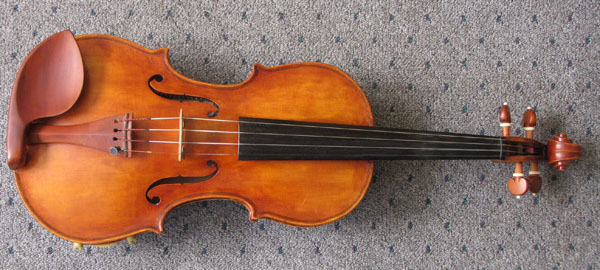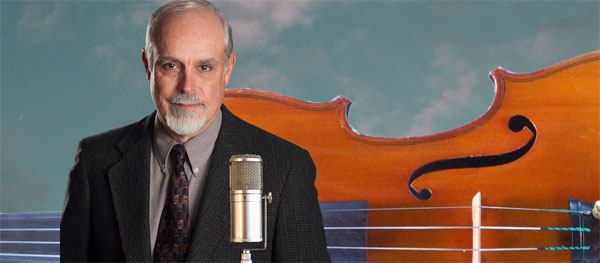
When someone asks me how long I have played the violin, I tell them about seventy years. But that’s not true. That includes about forty-five years that I didn’t play at all. About twenty years ago I started playing again, this time the fiddle and not the violin. Much of what I had learned as a kid came back to me, but then I had to learn all those tunes. Learning to play the fiddle (or violin) is really a life-long process; one never arrives at the final destination, but it is the journey that makes it worthwhile.
My story should begin a few generations earlier. I have a picture of my father at age twelve standing in front of his house in rural western Wisconsin, dressed in knickers and playing the violin. He never became much of a player, I only remember him playing once or twice when I was young, but he told me that his maternal grandfather, a Norwegian immigrant who lived to the grand age of 102, played the violin. I don’t know what kind of music he played, whether Scandinavian dance tunes or something more classical, but I like to think I inherited some of his musical genes.
When I was seven I showed an interest in music, and after a year of piano I started violin with my first three-quarter-size instrument. A few years later my dad bought a full-size violin, which I then began to play. I continued classical violin, competing with my friend for first chair in the school orchestra, until I regretfully gave it up in high school for a guitar and singing.
And then there are the fiddles in my life. I have had about five different violins at various times, and still have two. As a fiddle player I am often asked the difference between a fiddle and a violin. The answer is both simple and complex. The simple answer is that they are the same instrument. The complex answer is in the way the instrument is played. A violin player usually plays highly structured classical music, while a fiddle player plays in a much freer traditional folk style. I prefer the latter but still appreciate the former.
Here are some favorite fiddle quotes:
“We do not quit playing because we grow old, we grow old because we quit playing.”
Oliver Wendell Holmes
“We consider that the man who can fiddle all through one of those Virginia reels without losing his grip, may be depended upon in any kind of emergency.”
Mark Twain – Letter to Virginia City Territorial Enterprise, January 1863
“Fiddlers just want to have fun!”
Stacy Phillips
“I don’t want talking, I want fiddling!”
Luther Davis
“Get up, Kate. We can make more money plowing than we can playing the fiddle.”
John Morgan Salyer
“The music comes from the fiddler’s heart, through his strings and straight into your heart.”
Father John Angus Rankin, Cape Breton musician
“It was hard for the pioneers, but every now and again someone would get out the fiddle and make it all worse.”
Anonymous
And songs:
EDGAR, by Pam Ayres
Oh, don’t sell our Edgar no more violins,
That dear little laddie of mine.
Although he’s but eight, we’d prefer him to wait
For I doubt if he’ll live to be nine.
He plays the same song, and it’s sad and it’s long
And when Edgar reaches the end
With his face full of woe, he just rosins the bow
And starts it all over again.
Now Dad he says Edgar’s a right little gem,
It’s only his face that looks bored.
It’s really delight makes his face appear white
When Edgar scrapes out that first chord.
Daddy, of course, was filled with remorse
When Edgar came home from the choir
To find that his fiddle, well, the sides and the middle
Were stuffed down the back of the fire.
So don’t sell our Edgar no more violins
When next he appears in your shop.
His daddy and me, well, we both do agree
That his fiddling will soon have to stop.
Sell him a clean or a filthy magazine,
Ply him with whisky or gin,
A teddy, a bunny, or just pinch the kid’s money
But don’t sell out Edgar no more violins.
Although it would be a mortal sin,
We’ll do the little fiddler in,
Don’t sell our Edgar no more violins.
My older sister takes great delight in reminding me that when I was eight years old and just learning to play the violin, she couldn’t bear to hear me. It takes several years before a beginning player can play in the presence of other people. My friend Ken Waldman, “Alaska’s Fiddling Poet ,” learned to play fiddle while living alone in a one-room cabin in the remote wilds of Alaska; that’s the best way to learn. Here’s some advice from Ken:
OLD TIME FIDDLE LESSON, by Ken Waldman
“To Live on this Earth” (West End Press, 2002) and
”A Week in Eek” (Nomadic Press Audio CD, 2000).
To learn, lock yourself
and your fiddle in a room
all winter, and practice
until you play with a twisty
heartfelt rhythmic punch
that approaches trance:
fiddling is not technical
repetition anyone can master –
it’s the sound you make
once you know in the blood
you clog with your fingers
while that old devil music
dances inside the box.
THE VIOLIN, by Tom Bliss
Here’s a song by the English songwriter Tom Bliss. All he really knows about his old fiddle is that it was made in southern Germany or Austria in the 1930s, it has ‘Paris’ stamped on the bridge, and it was bought for him by his father in London in the 1960s. The rest is pure invention.
THE VIOLIN
I was built in a back street in Salzburg,
In a dusty and candle-lit room,
By hands that understood music,
And timber and varnish and glue.
With a lifetime of skill in his fingers,
He stroked the first notes from my strings,
And my voice sallied out in the darkness,
And my soul first unfolded its wings.
And I was dancing, I was singing,
But my story is locked in my soul.
I can laugh to your tune, cry for the moon,
But my silence sings loudest of all,
My silence sings loudest of all.
The star on the door told the story,
And he knew that the blackshirts would call.
When they dragged him away to the station
They snaffled me down off the wall.
Yes I played for their parties in Paris,
Where the jackboots kept time to the beat.
It was polkas and waltzes and mazurkas,
As all Europe lay bruised at their feet.
When the Allies rolled down into Paris,
The band made a run for the east.
But with a gun in the hands that had loved me,
My trooper fired back till the last.
Then a lad from the Kentucky mountains
Nicked his wallet, his watch and then me,
And the bluegrass was burning for Danville
In the barracks and down the NAAFI.
And with the peace I was back on the market,
Well, he’d a perfectly good fiddle at home.
I changed hands for two crates of Marlboro
And all over Europe did roam.
Then one rainy November in London,
With three silver balls,
A man noticed the price on my label
‘You’ll do for my lad’ he said.
THE MAPLE’S LAMENT, by Laurie Lewis.
This story is part of a longer interview recorded for the Rosin the Bow project. Here Joe McHugh recorded their conversation about her relationship with the violin and about the inspiration for a song called The Maple’s Lament that draws from that ancient spring from which all true folklore flows: Latin inscription (English translation) on an old violin, “When I was alive I stood mute in the forest. Now, in death, I sing.” The song begins at 6:22.
THE MAPLE’S LAMENT
When I was alive the birds would nest upon my boughs
And all through long winter nights the storms would ’round me howl
And when the day would come, I’d raise my branches to the sun
I was the child of earth and sky, and all the world was one
But now that I am dead the birds no longer sing in me
And I feel no more the wind and rain as when I was a tree
But bound so tight in wire strings, I have no room to grow
And I am but the slave who sings, when master draws the bow
But sometimes from my memory I can sing the birds in flight
And I can sing of sweet dark earth and endless starry nights
But oh, my favorite song of all, I truly do believe
Is the song the sunlight sang for me while dancing on my leaves
MORE ABOUT FIDDLES
 ROSIN THE BOW with Joe McHugh
ROSIN THE BOW with Joe McHugh
An audio journey through
the world of the violin family
A podcast of interviews with 45 fiddle players and others in the world of fiddles and violins.

Stew … this is a very moving and thoughtful article. It obviously reflects your years of love and acquaintance with the violin. Thanks for writing not only this, but also for all the work you do to keep alive and promote the rich folk music that belongs to all of us. Bob Nelson